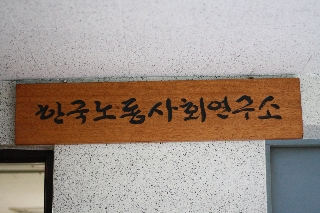Internships are thriving, but some may be deceiving
Editor's Note
Despite the positive prospects of the Korean economy, many still suffer with a feeling of uneasiness. Especially for university students who are employees-to-be, such a moment of unrest is a stressful situation, since a crisis means higher possibility of unemployment. In order to be relieved of the anxiety of unemployment and to be practicaly experienced, many opt for internship programs. However, unlike our high expectations, the reality of such programs is very different. In order to get closer to reality, this month's Cover Story is devoted to looking into internship programs.
- Cho Hee-soo, Editor of Current Affairs Div.
 | ||
WHEN ONE plays an RPG game, one kills a monster and gets experience points, which enable one to move up a level and kill stronger monsters. The same thing happens in the labor market, in which university students (and potential job seekers) struggle to build spec* , in order to secure a job more easily. Among this group, many consider internship as crucial to their future chances. Do all internships, however, help us avoid unemployment? The Yonsei Annals considers it essential to examine internships, and thus to help students make better decisions in the long run.
*Derived from the word "specification", it was originally used for describing electronic devices. Today it is used to refer to an aggregated sum of job-related certificates, scores, etc.
 | ||
Why an internship?
Originally, intern was a term defined as a physician who had recently graduated from medical school, and was currently learning medical practice in a hospital under supervision, prior to beginning a residency program. Nowadays, the meaning has been extended to cover any student or recent graduate undergoing supervised practical training in a particular firm or institution. In Korea, it was first introduced in this wider sense by the LG group in 1984.
Because of the various benefits it offers, an internship has become a crucial experience for many job seekers. For example, according to the Office of Student Affairs & Services, more than 300 Yonseians applied to internship programs in cooperation with the school and the government during the last summer vacation. Moreover, one can find approximately 500 internship-related online cafes on leading portal sites just by typing in the word, intern.
Such a phenomenon is due to the high youth-unemployment rate that Korea is now facing. In 2006, OECD released a report about the Korean job market, highlighting that the proportion of young people aged from 15 to 27 who are Not in Education, Employment or Training (NEET) is 17%, which is considerably above the OECD average. Also, the employment rate of young people was relatively low, at 27%, in 2006, compared to the OECD average of 43%. Since then, the situation has only got worse. The number of people willing to work was twice as high as the offical statistics, according to the Korea Labor Institute (KLI).
Reflecting the significance of this issue, the Lee Myung-bak administration has come up with policies to lower the figures. "Young people tend to suffer more than any others if the economy is in trouble," said President Lee Myung-bak at the end of 2008. Moreover, in a meeting with economy-related ministers at Cheong Wa Dae in February 2009, he emphasized the importance of "job sharing" as a means to alleviate the current recession. His words later developed into a policy called "Youth Internships." Also, as the nation's top 100 companies plan to hire 12,866 interns, the government is expecting a drop in the unemployment rate.
Face the truth
Despite this high unemployment rate and official support for internships, many interns are actually quitting their jobs. In March 2009, Hana Bank recruited 500 interns, but only 302 remain. Kookmin Bank also hired 650 interns, but 50 of them have already left their position. A similar situation affects the public sector. For public service interns, the average drop-out rate for the first half of 2009 hit 13%. Many government-related institutions failed to hire as many interns as they planned to do. For instance, only 400 students were selected for the Work English Study Travel (WEST) program operated by the Ministry of Foreign Affairs and Trade, which is far below the stated number of the envisioned goal: 1,300 people.
So why do so many people lose interest in internships? The most fundamental reason is the fact that they are no more than a "stepping stone" to regular jobs. "If you cannot get a regular position after undergoing it, it is a waste of time," advises Alias (Grad., Dept. of Business Admin., Yonsei Univ.), who became a regular employee of L'OREAL after completing a training course. In most cases, the percentage of interns who get a contract as a full-time employee is decreasing, in fact. During the first half of this year, when the nation's top 100 companies decided to hire more than 12,000 interns, they only planned to offer 5,200 regular jobs, meaning that more than 60% of interns will be laid off as soon as their contract finishes. The same situation exists in the public sector. According to a report released by Assembly Member Hong Hee-deok and the Korea Labor & Society Institute (KLSI), 95.8% of public institutions that are now recruiting interns ruled out any possibility to convert interns to full-time workers. Moreover, more than 70% of institutions gave no advantages for internship completion when interns applied for regular positions. These statistics show that more than half of the internship jobs are not much different from any part-time job.
Another reason for the interns' departures is the insignificance of the assigned work. "When we hire an intern, he or she will be doing only assistant tasks," says Kim Chol-in (President, a foreign consulting company). "Since an intern works for only a few months, the company cannot assign them any important projects, no matter how competent he is. Last year, we hired an intern who graduated from Cornell University. He mainly dealt with copiers and, sometimes, sorted letters," he added. This is also true for governmental interns. In conclusion, most internships involve doing simple office chores.
 | ||
Reasons behind the problems
The side effects of internships are triggered mainly by aggressive policies from the government that were implemented without proper preparation. From earlier this year, the Lee Myung-bak administration urged corporations to share societal burdens caused by the economic recession. This triggered a large number of companies to recruit interns in support of the government's effort to create more employment opportunities amidst the current downturn. Despite the government's emphasis, however, no specific guidelines have been released for government-supported internships. Many internships offered by corporations, therefore, lack standardized training courses in which interns can improve their skills and abilities. "I expected that I would learn something, but the only thing I learned through the internship is how to use copiers and how to deal with excel worksheets," says Bae Gi-hun (Grad., a two-year university). Some point out that it is nearly impossible for corporations to train interns, when many are reluctant to re-train regular employees during the present economic crisis. It is especially hard for big companies, who employ several hundred interns at a time, to provide a training course for each intern.
The situation is even worse with government-directed internships. Prematurely promoted, internships at public institutions and administrative agencies are misused. "The government is using 'Youth Internships' as a tool for distorting statistics and to lower the unemployment rate," says Jeoung Heung-jun (Department Policy Director, Korean Contingent Workers' Center). Not only do these jobs lack training courses, but they are also poor in content. This year, the government required each public institution, public corporation, and local government to hire a certain number of interns. This resulted in a situation in which the employers hired interns without any need for them. "Since there is no particular work given to me, I mostly sit and wait for someone to give me something to do. When there is nothing to do, I read books or study for certificate exams," says Kim Mi-young (Grad., Dept. of Social Welfare, Dong-a Univ.).
Another factor that has contributed to the abuse of internships is the unstable status of interns. According to the law, interns are classed as not much different from any other contingent workers. Therefore, no matter what they achieve or how well they complete tasks, their status will still remain unstable. This deprives interns of a sense of belonging. For public service interns, this is especially true, because they have to sign a specific contract before their work begins. "The public service internship contract makes it clear that there will be no re-contracting or an extension of the internship period," says Kim. Also, this keeps the wages of public service internship just above the minimum wage level, which is relatively low for college graduates.
Not only the students but also many experts disagree with the current system. "This 'Youth Internships' is a deformed policy, which cannot be found in any other country that suffers from youth unemployment as we do," says Jeoung. So, then, why did the government came up with this apparently failing policy? When the Lee administration took charge in 2008, they did not have any strategies to tackle youth unemployment. Following the financial crisis that started in the US, however, this problem came to the fore and was publicized by the mainstream media. The government hurriedly sought a makeshift solution, which was embodied in their "Youth Internships" strategy.
Originally introduced in 1999, the "Youth Internships" policy was abolished gradually, due to its inefficiency. As it was short-sighted, the policy had only created critics and victims. Many found it absurd that the government not only made it mandatory for public institutions to hire interns, but also instituted a 10% reduction in regular workers. This meant that there was an exchange of decent jobs for part-time jobs. Due to the increase in interns, the government could claim that the youth unemployment rate had decreased. Such a poor policy is not suitable for the long term, and indeed it is not even sensible for the short-term either.
 | ||
A move towards fruitful internships
Instead of a short-term approach to youth unemployment, measures that embody long-term strategies must be applied. Not only the government but also the school and the employers have to participate in internship courses. Through their coordination, students can be provided with more access to major-related internships. In that way, employers would have to train less, but rather would be able to hire more qualified interns who would be able to work more effectively. "Also, universities need to constantly evaluate and monitor the internships that students are taking, and therefore give feedback for improvement," says Kim Jong-jin (Senior Researcher, KLSI). This will enable these internships to satisfy the students and to meet their needs as well.
Also, protections for interns have to be created, since some companies are abusing this lack of safeguards. Especially, there are cases in which the civil rights of female students have been violated. "There was a case in which a female intern suffered from sexual harassment. Both the employer and the school refused to make a great fuss, rather than taking measures against it. She was very frustrated about the fact that nothing could be done," says Seon Daek Mi Rok (Adviser, Korean Women Link). By enacting legal protection for interns, the government will help to solve and prevent further problems due to their current low status in the workplace.
What is more important to solve the current youth unemployment problem is the need for young people to speak up for themselves, especially those who are affected by hardships in the labor market. "Change has to come, like it did in France," says Woo Suk-hoon (Author of the book The 880,000 won Generation). In 2006, French students participated in a huge demonstration against the CPE (Contrat premiere embauche)*. Regardless of the controversy over this law, such turmoil meant that many French youths were actually caring about their future. In Korea, however, especially in these hard-to-get-a-job times, everyone just seems to care only about his or her own future and how each can overcome their own adversities to find a job. Now is the time for us to speak up collectively, to look at where government policy is placing us, and to address this issue thoughtfully.
*French legislation governing non-regular workers. Under this law, it was easier for employers to fire employees by removing the need to provide reasons for dismissal during an initial "trial period" of two years.
* * *
The manager of the online caf?"Everything about Civil Service Interns" uses the nickname "Hope-as-torture". What does that imply for all of us? When internships were first introduced, their aim was to provide a good opportunity from which prospective employees could gain real work experience. Due to the mismanagement of the government, however, internships are turning out to be not only a financial but also a moral mess, which swindles thousands of young minds with the illusion that one can escape unemployment. The true vision of an internship as a "stepping stone" to a decent job must be achieved.
| Public Internships
- By the end of 2009, 16,000 public service interns will be hired. Applicants must be graduates or graduates-to-be of a four-year university and be aged under 29. They get to work at the central government or a local government for 11 months (maximum). Monthly pay is ₩988,000 (40 hrs of work per week). Public Corporation Internships (by the Ministry of Strategy & Finance) - Public institutions and public corporations will recruit 12,000 interns aged under 29 this year. Wages and other conditions may vary according to each institution. Small and Middle-sized Firm Internships (by The Ministry of Labor) - People aged from 15 to 29 can apply for the job, and they can work as interns for as long as 6 months. The Ministry of Labor gives 50% of each intern? wages to the corporation, and when the intern gets a regular position there is more support. |

